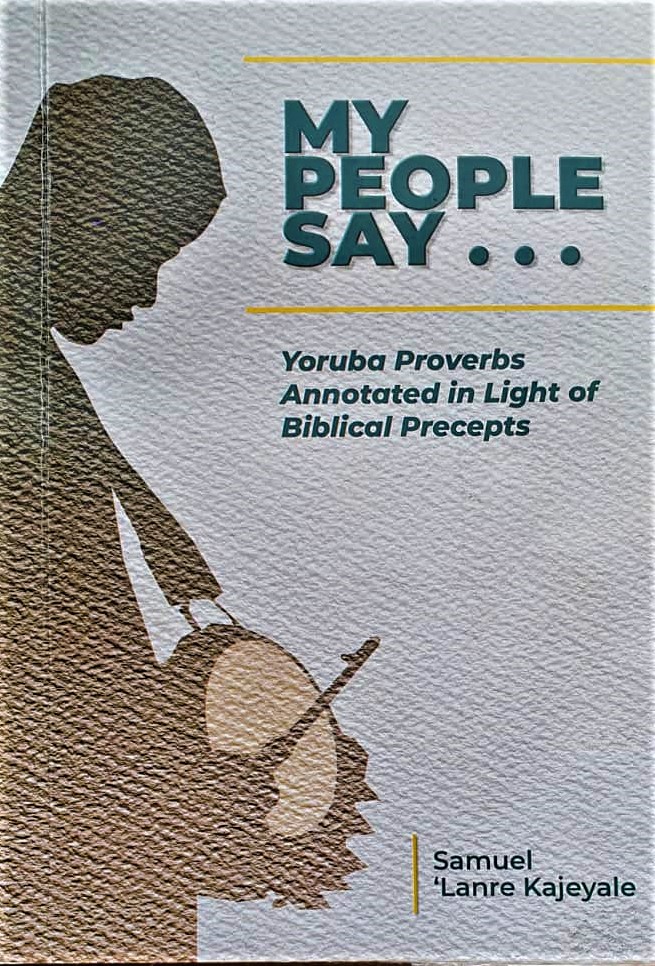Book Review: MY PEOPLE SAY … Yoruba Proverbs Annotated in Light of Biblical Precepts
By John M. Ade-Zaky
I welcome you all to this twin event of book presentation and launch of the Mercy Palsy Foundation. As a book reviewer, my job is to summarize the book’s essential contents and message and tell you, my impression. I will do that as quickly as I can.
As a member of the church that the author, Rev. Dr. S. O. Kajeyale, pastored years ago, ECWA Goodnews, PW-Kubwa, Abuja, I am very conversant with the circumstances that birthed this book. Rev. Dr. Kajeyale was barely a month in our local assembly when I observed that his announcements and preaching were prefaced by the phrase “My people say…”, followed by a stirringYoruba proverb that sent his listeners into delighted laughter, but to deep reflections for the discerning. One day after one of his moving sermons (which, as usual, wasspiced with doses of proverbs in Yoruba), I suggested to him that he should write a book on Yoruba proverbs in the context of the Bible. He didn’t listen. Whenever I raised the matter, he would politely brush it aside with a comment like, “OK, Elder. I am looking into it” and that would be that. He certainly is a busy man of God andI am glad that he has finally found the time to write and place this book in the hands of believers and the reading public.
The book My People Say: Yoruba Proverbs Annotated in Light of Biblical Precepts deals with proverbs. A proverb is a wise saying with a ring of moral truth that seeks to give advice, warning, or guidance. Proverbs are a means of imparting moral discernment and wisdom in daily living. The book of Proverbs in the Bible is a scriptural example, providing practical instructions to God’s people in dealing with the affairs of life. Thus, while the Psalms teach you how to pray, the book of Proverbs teaches you how to live every day.
All tribes on the surface of the earth have proverbs, riddles and wise sayings that are integral to their cultural heritage. For example, to underscore the necessity for first initiative if a project is ever to commence, the Chinese say, “The man who removed the mountain began by carrying away small stones.” The Russians also have a saying: “You can get to the ends of the earth by lying, but you will never get back.” The meaning is that every lie, no matter how ingeniously conceived or how long it lasts, cannot hold out forever; someday it will collapse under the weight of truth. (“Time discovers truth” is the Latin equivalent.) “Actions speak louder than words” is an English proverb. Its meaning is: Just saying that you will do something isn’t enough. You must be seen to act it. Americans say “Strike while the iron is hot” to draw attention to the need to do things while opportunity beckons.
Proverbs, folktales, anecdotes and wise sayings are some of the most effective and enduring means of sustaining the history, beliefs, values and entire worldview of African peoples. This is achieved from generation to generation through oral traditions, with griots or the elderly as vehicles. Thus, Amadou Hampate Ba, the noted Malian author, says, “In Africa, when an old man dies, it’s a library burning.” The reason is that the aged are the custodians of the cultural heritage of their people, a role that has often earned them the venerable epithet “the one who knows.”Jesus Himself quoted Jewish proverbs back to His listeners to underscore points in His teachings. On one occasion while in His village, Nazareth, He said, “You will surely say this proverb to me, ‘Physician heal yourself!’ Whatever we have heard done in Capernaum, do also here in Your country” (Luke 4: 23.)

In Africa also, proverbs are a prized heritage.Chinua Achebe’s Things Fall Apart, a novel depicting Ibo culture before its disruption by colonialism and Christianity, tells us that among the Ibo of Eastern Nigeria, “the art of conversation is regarded very highly, and proverbs are the palm oil with which words are eaten.” Achebe cites an example of this when a creditor comes to demand payment of a long-standing debt. The debtor replies, ”Our elders say that the sun will shine on those who stand before it shines on those who kneel under them. I will pay my big debts first.”
My people, the Atyap of Southern Kaduna, say “Afwui swaat shyung long bah” – literally, “Burnt corn fears no fire.”By this, they mean that a person who has endured the most excruciating pain or adversity is immune to any kind of hardship.
The Yoruba nation in Western Nigeria has a rich repertoire of proverbs that punctuates every fabric of their life as a people. These proverbs are used to decorate and enhance the quality of discourse from the hideous to the religious, the historical to the philosophical. In this insightful book, the author relates some of these illustrious traditional sayings of the Yoruba people, tying them to their biblical contexts to edify Christians and non-Christians alike. This is a most commendable endeavour, for if culture – of which proverbs are an integral part – is to have its proper place in God’s creation and glorify Him, it must bow to the dictates of Scripture. Miles Lanes illustrates this in his adorative hymn “All hail the power of Jesus’ name”: “Let every kindred, every tribe/On this terrestrial ball/To Him all majesty ascribe/And crown Him Lord of all.”
The book is made up of 180 pages, 24 Chapters and 55 annotated proverbs. For ease of reading and reference, the Proverbs are arranged under topics as Chapters. Each Chapter deals with a proverb or number of proverbs, covering topics like adventure, appreciation, courage and cowardice, evil and crime, forgiveness, hard work, diligence and indolence, money and riches, opportunity and use of time, shame and dignity, destiny and death, the cross and the crown, Jesus’ return and judgment.
In order to facilitate reading of the book without an open Bible, relevant scripture verses related to a proverb are quoted in full, with the version indicated. However, where the scripture under reference is too long, the author summarizes it, highlighting the issues in view. Commentary may be longer and in-depth in Chapters where the proverb being annotated touches on a matter critical to proper Christian doctrine and practice; thus, “rightly dividing the word of truth” (2 Tim. 2: 14, NKJV).
The author’s approach is not only logical; it is easy to understand by non-Yoruba speakers. First, he cites a proverb in Yoruba, then provides an English translation, states the usage of the proverb, and then backs it up with a scriptural reference. There is a distinctive ‘aura’ in every language which is practically impossible to capture in translation to another language. Consequently, the grammar used in translating the proverbs from the Yoruba language to English is colloquial and, sometimes, untidy. This is because, while the author has tried to keep the English translation as close as possible to the original meaning conveyed in a proverb, he has also had to balance that with the need to retain its original linguistic flavour. In that way, the meaning of the proverb is not sacrificed on the altar of good grammar. Here is an example: Yoruba: Ajanaku koja mo ri nnkan firi, b’a a ba r’erin k’a pe a r’erin.
English: Elephant is more than ‘I saw an object in a flash’; if one sees an elephant let him confess seeing an elephant.
Usage: To rebuke one who under-appreciates another person’s achievement.
Neh. 4: 1-3 – Tobiah: “What are they building? Even if a fox climbed upon it, he will break down their wall of stones!”
The primary message in this book is that we find wisdom for daily living if we follow the moral and ethical instructions of the proverbs annotated here or any other proverbs.
Secondly, this book should point readers to the Book of Proverbs in the Bible, whose preamble states:
The proverbs of Solomon, son of David, King of Israel:For attaining wisdom and discipline; For understanding words of insight; For acquiring a disciplined and prudent life, doing what is right and just and fair; For giving prudence to the simple, knowledge and discretion to the young.
Let the wise listen and add to their learning; And let the discerning get guidance for understanding proverbs: The sayings and riddles of the wise. (Proverbs 1: 1-6).
Thirdly, proverbs, whether Yoruba, Nupe, Kilba, Fulani, Itsekiri, Ibibio, Bero m, Adara, etc., all contain a grain of God’s moral truth and can serve as a good guide to anyone in exercising proper discretion. This is because all truth is God’s truth, as St Augustine said.
Finally, you will find as part of its message the picture on the front cover of the book. The reader needs no one to tell him that this is a typical Yoruba man drumming away with his traditional talking drum – perhaps at an Owambe party! Or, more appropriately, to a praise-worship session in church.
In your hands is a book that fills an important gap in Christian literature as far as traditional African folklore is concerned. We hear in this engaging work the Bible speaking to us through our indigenous cultural milieus, with Yoruba proverbs as the guiding light. The concept, I think, is original, as is the presentation. This is one book that should be on the shelf of every library with quality literature, whether Christian or ‘secular’. The thirsty, whether preacher, teacher, student, Christian or non-Christian, can draw and drink from this well of wisdom and go away satisfied.
Andrew Haruna is a professor and former Vice Chancellor of a Federal University. He is currently the Vice President of the Nigerian Academy of Letters and Secretary General of the Committee of Vice Chancellors of Nigerian Universities. In his endorsement of this book, he says (among other things):
“The overall structure of the book is clear and easy to follow. In terms of scope, the book is comprehensive. … [It] is unique and distinguished by the fact that it is the first (to the best of my knowledge) all-inclusive and systematic book which presents Yoruba proverbs [in a manner] rightly dividing the word (2 Tim. 2: 14, NKJV) …. I have no iota of reservation in recommending this splendid study of Yoruba proverbs in the light of the Scriptures…”
Allow me to humbly adopt Prof. Haruna’s endorsement of Kajeyale’s ground-breaking book, My People Say… Please join me in congratulating Rev. Dr. S. O. Kajeyale for this great achievement. May your pen never dry, Sir.
Thank you all.
God bless.
This review was presented by J.M Ade-Zaky Esq, at the unveiling of the book and launch of the Mercy Palsy Foundation in December 2024 in Abuja, Nigeria.



Post Comment